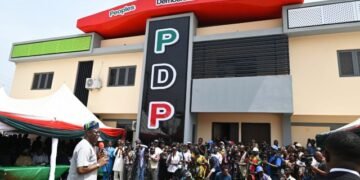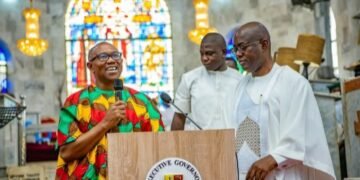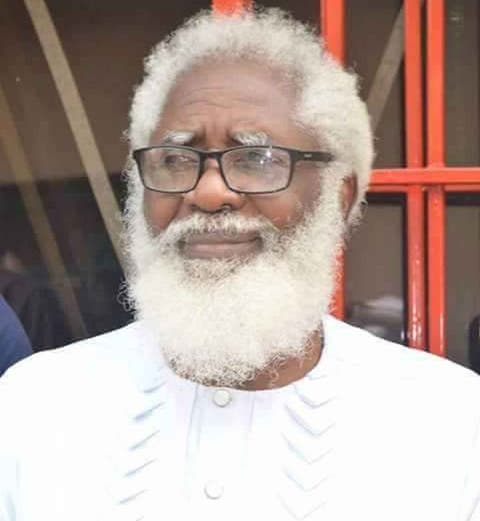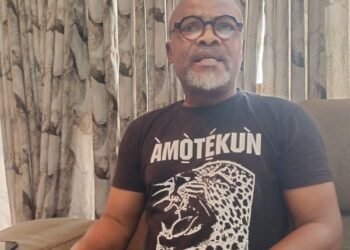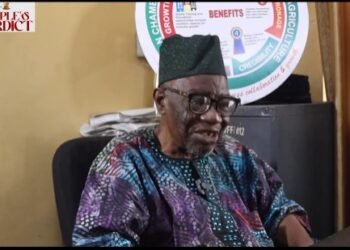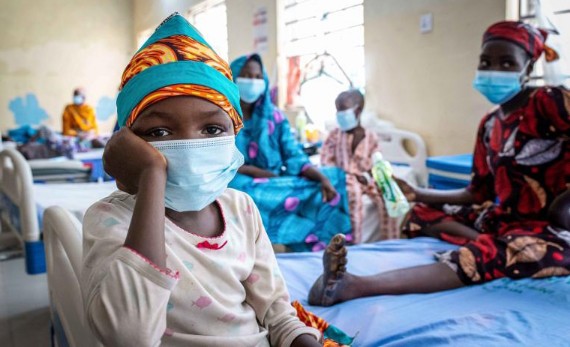Unification Constitution Stifling Nigeria’s Unity, Development-Farounmbi
His is a very silent but latent voice on issues affecting the country. He is Dr Yemi Farounmbi, Nigeria’s former ambassador to the Philippines. In this interview with the Newscoven.ng, he speaks on the failure of the Nigerian State to attain its full potentials and the frustration of the citizenry, given the pervading dearth of good leadership.
You have recently been on the quiet side on issues affecting the country. What is happening?
Nothing really. I think there is too much noise; too many voices talking at the same time. And because the voices and talks are not organised, they don’t have the weight they should carry. In times like that, you choose when to talk. One of the lessons I learnt from Chief Obafemi Awolowo was that in the latter part of his life, he probably spoke once in a year, usual on his trip to the US. But that one speech will be much better than the silence of the preceding year. We appear to be talking too much, sometimes without having organised our talks or organised the goals we want to reach. That is the reason I sometimes just keep quiet.
During a chat with you, preparatory to the last Independent Day celebrations, you expressed optimism that Nigeria of your dream can still happen in your lifetime. Could it be that this dream not becoming a reality is the reason for your silence?
I had a dream, like the Americans had a dream, that we are going to exist in a society where everybody can develop his talents to the maximum; where everybody can grow to the optimum of his ability. I had a dream where everybody can feed himself; where everybody can house himself; where everybody who is physically able would be able to engage himself. I still have that dream, but whether that dream would be in Nigeria as presently constituted, I have always doubted it.
I have always believed that, for Nigeria to fulfil its vision, it has to rearrange itself back to what it started with. It is our inability to recognise the better days in our land and what created those better days and to restore those better days that is creating what we have now. Nigeria can have a unity but Nigeria cannot have unification.
But that appears contradictory and a bit confusing…
Unity is a voluntary and a willing process, coming from the inside of the people. Unification is an imposition that, compulsorily, you must stay together. For us to have unity, we have to sit down and say ‘this house which we all want to live in, let us agree on the drawing plan. How many rooms? Is each room going to be ensuite? How many dining? How many sitting? How are we going to interact?’
So, if you go back to the beginning, how did Nigeria start? Under the British, there was a Western Protectorate; there was an Eastern Protectorate; there was a Northern Protectorate and there was a Colony of Lagos. Then, there was a merger of the East and the West to have a Southern Protectorate, but still keeping the differences between the Western and Eastern Protectorates. Then we had an amalgamation and we had a Nigeria but still preserving, as it were, these foundational cornerstones.
By 1951, we all agreed that the best form of government for us to be called a country is federation. So, we had a Western Region, that used to be the Western Protectorate. We had an Eastern Region, that used to be the Eastern Protectorate and we had a Northern Region, that used to be the Northern Protectorate. It is not really the regions that matter; what mattered was the freedom that each region had. All residual powers were vested in them. Then, they had a central government in Lagos, with the Colony of Lagos becoming the capital of Nigeria, being independent of the Western Region.
But the powers in the centre, as at that time, consisted of what they called the Federal Exclusive List, 22 items. The regions were free to exploit their resources and their talents to the optimum and allocation was on the basis of derivation. So, you contributed, you produced and you kept. You only had to pay, as it were, a rent to the centre. The centre had just about 20 per cent of all the revenue.
So, the regions had the freedom to do what they wanted. They can choose their priority: whether it is education or agriculture; whether it is industry or commerce. In fact, they were free enough to even have their own embassies abroad; what they called Agent Generals. What binded them together were foreign policy, defence, currency and a few items like that. So, we were working towards unity.
Then, there was the event of 1966; the January boys attempted a coup that failed. They handed over to a Thomas Aguiyi-ironsi that was not ready for governance. In the sixth month, he ruptured the federal arrangement and introduced what he called the Unification Decree. That was the beginning of the problem. Ironsi abolished the regions; he called them group of provinces. He centralised the public service; he centralised the teaching service and imposed a unity on people that have divergent culture, divergent tradition, religion, mores and history.
Of course, there was the July 27, 1966 counter-coup and, because of the anger of the North and the fact that their political and military leaderships have been killed in January, they wanted to opt out of Nigeria. That was not the first time that the North wants to opt out. In 1953, when Anthony Enahoro moved the motion that Nigeria ought to be independent in 1956, the northern delegates in the House of Representatives were angry and they threatened that the North would seceed.
Subsequently, the East, as a result of the progrom and the mass killing that followed the 1966 counter-coup, retreated to the Eastern Region, the Igbo and related tribes and opted to be Biafra. By then, the basis of unity has been ruptured. That was, in fact, stated in Yakubu Gowon’s speech, on July 27,1966, that the basis of the unity has been ruptured.
So, what we have been doing since then is to have a unification imposed; a centralisation and a hierarchical structure and equalisation without providing for justice and equity.
But this is not peculiar to the country. There were countries that ran into troubled waters but later found their feet, either by going their separate ways or still found cohesion among the inhabitants, such as we have in the former Western and Eastern Germany. What then are the problems inherent with the Nigerian State, more than 50 years after that sad occurrence that changed the face of the country?
The first thing is that the government or the succession of governments from 1967 until 1999, that provided for about 28 years of military leadership and, excluding six months of Aguiyi-Ironsi, three years, seven months of Olusegun Obasanjo, were all northerners who, unfortunately, did not look at Nigeria from a comprehensive point of view, but looked at Nigeria from the prism of being northerners. What does this mean?
It means that, as at today, we have 19 states in the North and 17 in the South whereas, in 1967, it was six in the North and six in the South. What does this mean? Three senators from each state means that the North stands at an advantage in any bargaining situation.
Then, you go to the House of Representatives. Because of the unique Nigerian concept of demography, where the desert is more heavily populated than the southern coastal areas, you will find that the North has more seats in the House of Representatives than the South. For example, between Kano and Jigawa states alone, the number of House of Representatives’ seats that they have is more than what the entire South-East has. So, it means, that in any bargaining situation, because the northerners have dominated the military governance of this country, the North has been put in a position of a stronger partner.
To worsen the situation, the Nigerian Constitution has provisions that made a change of that constitution difficult because those who are advantaged by the constitution are also those who have the number of state or House of Representatives seats in their advantage. So, it is difficult.
You cannot have unity where there is no equity or where there is no justice. You talked about Eastern Germany and Western Germany. This was a division superimposed on Germany as a result of the defeat of Hitler’s Germany by the Allied Forces. But, over the years, cultural affinity, religious affinity, economic, industrial, agricultural and political relationships brought the two Germany together and, at the end of the day, they broke the Berlin Wall and they became one. Because it was something that came out of them voluntarily, they were able to reunite again, in spite of the rigidity of the Cold War.
Now take Nigeria, we had enforced a unity or what I called a unification that does not come from the inside of the people. You would have observed that, all the years we freely interacted, nobody ever talked of secession. It is when you want to superimpose your views by force on the other that the other person has an option of accepting or resisting. When he begins to resist, then the fractions begin to appear and that is what is happening in Nigeria.
The military imposed on us, beginning from the 1979 Constitution, a presidential system that was centralised and that was hierarchical. Today, there are 68 functions on the Federal Exclusive List. Today, the Federal Goverment takes 53 per cent of the total allocation. Today, they have so much money at the centre that they begin to give bailouts to the federating units.
In a normal federation, it is the federating units that ought to be bailing out the centre because it should be a contributive federalism. But what we have now is a distributive one where the centre owns everything. For example, the Constitution vests the authority on land in the state governors. Yet, that same Constitution vests the minerals that are in the land in the Federal Goverment.
The Constitution creates a Nigeria Police Force where we used to have a Nigeria Police, state police and local oolice and now puts under one man, an Inspector General of Police (IGP), a total area of one million square kilometres. Everything points to the fact that that is beyond his capacity.
In the US, which we have copied, they have policemen at the lowest level, the boroughs and so on; they have police at the state; they have police at the federal; they have the FBI but each one knows its own limits. But in a centralised police, not federal, we suddenly find that some policemen who do not understand the language, the culture and ethics of an area are sent there. How would they police such an area? You are centralising; you are imposing a unification.
In the US that we copied from, we don’t have the equivalent of an Inspector General of Police. In the UK, from where we got our freedom, there is no equivalent of a Nigeria Police Force. What they have are territorial police formations; one for London, one for Liverpool, one for Greater Manchester and so on.
Did you think or see all these differences as being beyond reconciliation?
They are not beyond reconciliation, if we sincerely want a reconciliation. First of all, the greatest problem we have in Nigeria today is that we don’t all have the same definition of the problem. Some people in the South believe that if you rearrange Nigeria, restructure Nigeria and give it a people’s constitution, we would begin to solve the problem. Some people benefiting from this unification constitution resist. So, we don’t have a common understanding of the problem and it has therefore become difficult to have a common solution to the problem.
What we need in this country and that which is very lacking are patriots who really love this country better than the grandeur of offices. Let me give you an example: There was a USSR; it was a counter-balance to the USA. It was the bastion of Communism. But when Mikhail Gorbachev took over as the leader, he realised that the USSR could not survive; he realised that, in the better interest of the people, the various ethnic nationalities that made up USSR, there was a need to have a restructuring, that is what they called Perestroika and then there was a need for openness and freedom, that is what they called Glassnot.
With that, Gorbachev created 15 republics. And, today, Russia is vibrant, Ukraine is vibrant and there are many other republics that are doing well. This is simply because there was one person that had a commitment beyond the office he held. It didn’t matter to Gorbachev that he has to lose the status of being the President of the USSR; that even in the Russia that he belonged to, he had to surrender to Boris Yeltsin. The love of office was secondary to the love of his country.
There is a speculation that there is a document signed proclaiming Nigeria and that, within the document, there is a clause which stated that if the people that made up the country could not come to terms on their existence within 100 years, each ethnic group is free to take their exit from the arrangement. Now the 100 years have lapsed, from 1914 to 2014. Are you aware of such a document?
Well, I have seen it on the social media. But in my view, the way to test the veracity of such a document would be to go to court, either domestic court or international court, and seek either an interpretation or an implementation of that document.
But don’t you think that can only be possible if we can lay our hand on the document?
I am sure that if the document is genuine, it would be with the British Government and we should be able to access it from their archives. You can, in fact, approach the court in Britain; you can subpoena for the document and you can then seek for an interpretation or an implementation of it. That is one.
Two, you have to now agree on what would be the process of establishing that the citizens are not willing to stay together. It cannot be on the basis of some group or somebody. It would probably mean there now have to be put in place, maybe a form of legislation or what I will like to call a form of negotiated consensus that, if we now want to implement this clause, if it does exits, then there probably have to be a referendum in each area that the people want to opt out. It is then you can really validly say that the majority of the people, in all fairness, want to opt out.
Given your experience all over the years, what you have seen and heard, do you think the country is ripe enough for what happened in the former USSR?
The problem we have in Nigeria that had really militated earlier than today a USSR solution has been the multiplicity of ethnic nations. If Nigeria had consisted of only three ethnic nations…the Hausa/Fulani, the Igbo and the Yoruba…it would have been easy to go the Czechoslovakian way. We can sit down on a table, shake our hands and everybody will go his way.
But, in-between these three ethnic groups, you have more than 300 others. You have the multiple ones of the South-South; the multiple ones of the North-Central and some of the multiple ones in the North-East. They are too small, too many that probably they cannot stand one on their own and, sometime, they cannot stand together as a group.
So, if you replay back to 1967, you will find that in the ad-hoc Constitutional Conference, the only region that stood for a strong centre was Mid-West. The West was comfortable with confederation. The East was comfortable with confederation. The North, in fact, was agreeable to confederation, even though they changed overnight and supported the Mid-West because they could see the advantages to them on the basis of their presumed population and size.
The Mid-West looked at itself; in Warri alone, there are four ethnic units…the Urhobo, the Ijaw, the Itsekiri, the Igbo and so on. They looked at the difficult of sustaining each ethnic unit as a viable nation. So, they preferred having a bigger federation than having a smaller federation in which they are going to be in the minority.
Generally, the South-South, the North-Central and, sometimes, the North-East are not likely to support a USSR option. They would prefer a situation in which you rearrange Nigeria and you can have six zones. Give them enough freedom, enough power, enough resources; give them enough room to develop themselves but within the ambit of that bigger umbrella called Nigeria. There they, as small as they are, will not be oppressed. So, they see the big Nigeria as a key to their own preservation.
Whereas, the Igbo and the Yoruba are comfortable enough to stand on their own because there are countries that are not as big as them. The North, the Hausa/Fulani complex, can stand on its own, but it wants to continue to take advantage of the oddity, the inequality that have been conferred on it by the subsisting illegitimate constitution.
Could that be the reason for the recent statement by the northern governors that they would support restructuring but not a rotational presidency?
I think that is an arrogant statement because, when you go into a negotiation, you never know what would come out of it. In any negotiation, you must be willing to accept the conclusions of that negotiation. You cannot start the negotiation by predetermining one of the elements that would be in the negotiation.
Who tells them that in the negotiated restructuring, there would be a president? Who tells them that we would not have a chancellor or a prime minister? Who tells them that in the negotiated restructuring, there would not be clauses for self-determination or that there would not be provisions for whoever wants to opt out to opt? How did you predetermined conclusions, abnitio? It shows their unwillingness to look at the advantages of the size of Nigeria and the ways those advantages can materialise. And the only way they can materialise is for every participant of the country called Nigeria to be happy. If he is not happy, then he is going to begin to agitate until he gets his own freedom.
Governor Godwin Obaseki of Edo State recently alleged that the Federal Goverment is printing money to sustain the federating units. He particularly mentioned N60 billion as the amount recently printed by the Central Bank of Nigeria (CBN) for that purpose. Of course, the Minister of Finance denied the allegation, while the CBN governor reluctantly admitted that it was true. What is your view on the development?
It shows that nobody is in charge of Nigeria. This is because if we have a federal economic policy, then the two of them will be on the same page, talking the same thing. In any case, if they print or don’t print currency, the governor of the CBN is the person that is in charge. So, I am more inclined to believe him than a minister that really has not enunciated to us, in definite terms, the economic goals and the economic approaches of this country.
But why would it not happen? It has to happen because we have a wrong architecture in terms of constitutional arrangement of the federating units. You would have that situation in which some state governments depend on federal allocations for up to 90 per cent of their revenue.
By my last investigation, there is no state in the US that depends on whatever you called a federal allocation for more than 24 per cent of its revenue. Which means that, at least, 76 per cent or thereabout would be generated within that state. For the equivalent of a local government, it is 22 per cent. So, each local government generates about 78 per cent of its own revenue. Why has it changed in Nigeria?
It is because we now over-centralised. Suddenly, everybody lost interest in cocoa that used to be the mainstay of the economy of the West; that provided the money for free education; the free health services; the Bodija Housing Estate; the Yaba/Ikeja Industrial Estate; the television and radio houses; the pilgrimages boards; the minimum wage and so on.
Over-centralisation has killed the initiative of the East in the pursuit of the agrarian revolution that Michael Okpara started. Nobody talks about the palm kernel and palm oil again. We used to be Number Two in the world; we are no number now. Malaysia that borrowed palm kernel from here is now Number One. Yet, agriculture contributes only 11 per cent of their economy because their economy has so grown. Ours has not grow.
What has happened to the Groundnut Pyramid in Kano? Now, our textile mills are closing down because we have no cotton. Even the tobacco companies have to be importing tobacco from Zimbabwe. So, what happen? Agriculture that used to be the mainstay has been abandoned because there is free money from oil that didn’t belong to all of us but that has been appropriated by all us. That is the first thing. And what is the cause of it? Over-centralisation; the wrong architecture of the country.
Malaysia and Indonesia were like Nigeria in the 1970s. The three countries depended on crude oil for about 90 to 95 per cent of their income. Today, Malaysia depends on crude oil for only eight per cent. The quantity of oil has not reduce but because the economy has so grown, the relevance of oil has become small. Agriculture has become 11 per cent; manufacturing has become 34 per cent; financial tourism and such services have become 42 per cent. What has happen to us?
We have been unable, in this unification constitutional arrangement, to grow our economy; we have been unable to diversify it. We have been unable to grow our industries. As a matter of fact, there has been a drift of our industries elsewhere. We have been unable to take advantage of tourism, music, film production. We are Number Two in the world when it comes to film production, yet we are having nothing to show for it because the economy is structured in such a way that the films would just go; nobody earns any Kobo from film production.
We just heard of recent what happened to the gold in Zamfara State, in Sokoto State and in Ilesa area of Osun State and the gemstones in Ibadan, up to Oyo. Some foreigners are taking them away. All the gemstones that we have are carried away as laterites from Nigeria. They are processed and they are sold back to us at heavy price.
We produce crude oil; we export it. From each barrel of crude oil, you can make about 140 products. They carry our crude oil away; they return kerosene, diesel and petrol to us. The other products from crude oil, they use for their own country. And because there is imported inflation; we are importing inflation from other countries, the cost of crude oil grows up here.
If we had arranged our economy the way the US arranged its own; nobody cares what Texas does with its crude oil. Nobody cares what Nevada does with its games, hotels and casinos. Today, Los Angeles has the highest GDP all over the world; nobody cares what they do with the Silicon Valley and so on. Each region is capable of developing itself; it pays, as it were, a tax to the central government.
But when the central government takes control over what it had no control over, and then begins to share the money, even to those who have contributed nothing, then, of course, you have a demotivation. There is no reason why Lagos cannot survive on its VAT alone. The VAT gives probably as much as the crude oil but it is pooled into a central purse. Even those who don’t like products like beer and tobacco share out of the money from the VAT.
So, a re-arrangement of the economy would take us away from a situation in which we have to print money. This is because a local government, each state or whatever you call a federating unit will be able to generate enough income to run its governance.
In the 1959 budget of the Western Region, that was the last budget by Chief Obafemi Awolowo, only 17 per cent of that budget was on salaries and other charges. The rest was on developmental projects. What do we have now? We take money from the Federal Allocation and 90 per cent of that allocation would be spent on salaries. So, there will be no money for capital development. The willingness to work, the willingness to industrialise, the willingness to generate income has been killed by the unification constitution that we have and now we have found ourselves in a situation where we have to print money.
You earlier said nobody is in charge of Nigeria. Would that explain why the Minister of Communications and Digital Economy, Isa Pantami, by the fact of his utterances in the past, is linked with insecurity and groups like Al-Queda and yet nobody is asking question from the side of the government?
Two things are wrong; first, in a country where there is value; where there is honour and dignity, if you are caught in that situation, you don’t need to wait for anybody before you resign. When Kemi Adeosun was caught in a situation less significant than this, she resigned. So, where there is honour and integrity, if you have been caught by an admission that you are happy when the citizens of a country over which you seated as a minister are killed, you don’t need anybody to tell you before you resign.
But if you choose not to resign, there is somebody who appointed you. If, indeed, he is in charge; if, indeed, he is alert; if, indeed, he is hearing the grumblings of the people who are being killed and their death makes this minister happy, he ought to have been fired yesterday. But nobody cares about this country, nor do they care about some of the citizens.
What did you think this portends when you have an appointed security personnel being caught among armed robbers, just like we have a minister who is linked with terrorist groups?
Because he has no honour, that is why he is a robber, in the first instance, and so he cannot resign. I expect that whoever supervises the man appointed to catch a thief ought to have relieved him of his position. But there have been too many instances that illustrates that nobody cares. When a sitting governor says some people have the right to carry AK-47 guns when all Nigerians were told, three years ago, to return their arms and nobody ask any question; when a sitting governor only sees death when the oppressor is resisted by the oppressed, like our governor talked the way he talked and nobody ask any question, then you have told the citizens that they are on their own.
And where lies the hope for the citizens?
There is always hope for the citizens. I like quoting a French author, Soltaire; he said: “Even the man in chains can be free, even if it means his death”. And the Bible puts it differently when Isaac spoke to Esau. He said ‘there will come a time, you will become strong enough and you will remove the bondage’. When justice does not prevail; when equity is thrown overboard; when preservation of life is considered a partisan issue, then those who are at the brunt of the oppression would seek, no matter how long, to free themselves from the bondage, just like the Blacks did in South Africa. It took a long time, but they became free.
And the freedom came because there was a statesman called Frederik Willem de Clerk. He was an apartheid believer; he was a South African president who believed so much in the white supremacy. But he realised that without a negotiated consensus that incorporated the Blacks, there will be no South Africa. He surrendered the Office of the President; he became vice president to Nelson Mandela.
But when some people don’t know that a temporary advantage of today can become your albatross tomorrow and they think that a temporary advantage will remain permanent, then they behave from a point of arrogance that leads ultimately to a fall.

